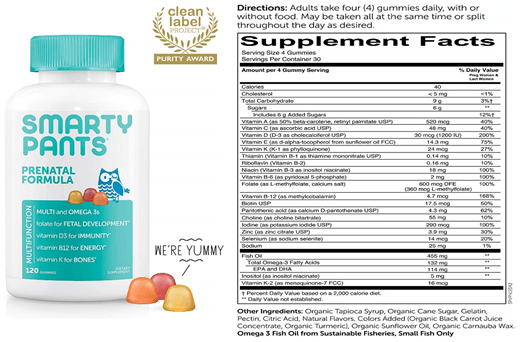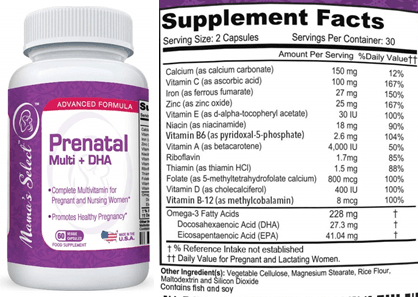How to Choose the Right Prenatal Vitamin
Share this Article:

Prenatal vitamin with folic acid or methylfolate?
You’ve probably heard that you should be supplementing with folic acid during pregnancy. It is key for your baby’s growth and development. It is also important to support your production of new cells, and repair of damaged DNA! Healthy levels of folate can also help prevent several forms of cancer, heart disease, Alzheimer’s Disease and stroke. There is also evidence folate helps people with depression [13] . Let’s consider if you should choose a prenatal vitamin with folic acid or methylfolate.
Folate and folic acid: what is the difference?
Folate, also known as Vitamin B9, comes in many forms. It is commonly found in legumes, lentils, leafy green vegetables, eggs, and citrus fruits [2] .
Folic acid is the synthetic form of folate that can be commonly found in enriched fortified foods such as breads, rice, pastas, and breakfast cereals that may be labeled “Fortified”. Folic acid is more stable when subjected to heat and light. This allows it to be stored longer, and endure being cooked, It is therefore in a lot of foods. The other forms of folate can be easily broken down by heat and light [1] . Folic acid and the folate that we consume from foods, are not metabolically active. This means it has to be converted or broken down into an active form that our bodies can use. Our body does this with a particular enzyme called MTHFR to help with the conversion process [3] .
MTHFR gene mutation
MTHFR is also the name of the gene that makes the MTHFR enzyme. This enzyme is needed to convert the folate we eat, and the folic acid in supplemental vitamins into an active form called methylfolate. However, new studies are showing around 40%-60% of women in the population have a MTHFR mutation that slows or prevents enzymes from creating methylfolate from folic acid [2] . Low levels of folate can cause; anemia (not enough red blood cells produced), high homeocystine levels which can lead to heart disease, and immune system problems. This mutation can also affect your male partner. MTHFR mutation can cause problems during pregnancy and also when trying to conceive [4] Talk with your doctor about testing for MTHFR gene mutation so you can be better prepared for your healthy folate needs.
The problem with folic acid
If your body has an MTHFR mutation, and you supplement with folic acid, it may lead to high levels of unmetabolized folic acid, affecting both you and your baby. Too much unmetabolized folic acid will prevent methylfolate from doing its job. The receptors that absorb methylfolate will grab the folic acid preventing the methylfolate from being used in your body. It is like putting the wrong key in a keyhole, so when you find the correct key, the keyhole is blocked. The abundance of folic acid overwhelms the receptors so that methylfolate is not absorbed properly. This problem can then lead to fetal loss, immune dysfunction, and in some, acceleration of certain cancers [4] .
Lastly, pregnant moms should use caution eating a diet high in fortified enriched foods such as bread, pasta, or cereal while taking a prenatal vitamin containing folic acid. This combination can also lead to high levels of unmetabolized folic acid [5] .
Consider this example:
If you have 1 cup of cereal for breakfast (about 229 mcg folic acid), a spinach salad and bread for lunch (about 96 mcg folic acid), and a bowl of pasta for dinner (about 219 mcg folic acid) you would have consumed 544 mcg of folic acid. Then, if you take a vitamin with folic acid (400-800 mcg daily), this would bring your daily total of folic acid to 944 mcg – 1,344 mcg. [10] Your daily dosage of folic acid should not exceed 1000 mcg [11] . For someone with the MTHFR mutation, this is concerning because you would have excessive amounts of unmetabolized folic acid.
Benefits of methylfolate supplements
It can be really difficult for a woman to get the daily dosage of folate from just food, which is why it is essential to supplement with a prenatal vitamin. Without sufficient levels of folate in pregnancy, neural tube defects like spina bifida and anencephaly (underdeveloped brain) can result [9] .
Methylfolate is essential for all woman of child bearing age due to its importance in the development of the neural tube, which develops as early as 3-4 weeks gestation [6] . An unexpected pregnancy can come along any time when engaging in sexual activity. Neural tube development has most likely occurred before a pregnancy is suspected and a test done. For this reason methylfolate supplementation is highly recommended for all women of child bearing age.
Supplementing with methylfolate has many additional health benefits, including playing an important part in the process of DNA repair, controlling homocysteine (an amino acid), recycling molecules for detoxification, regulating mood and reducing inflammation [7] . It has also been found to increase red blood cell production, preventing anemia. [3]
In the past it was highly recommended that all pregnant women should take folic acid. There was a lot of research done to demonstrate the benefits of folic acid before, during and after pregnancy. With MTHFR mutations in mind, scientists are proving methylfolate will produce the same results. One study showed that “supplementation with methylfolate was more effective than folic acid at increasing red blood cell [methyl]folate concentrations”[3].
If no MTHFR mutation is present there should be no problems with supplementing methylfolate instead of folic acid. The enzymes that would change the folic acid would be bypassed, and you would be supplementing the folate form that is ready to be absorbed.
How much folate do you need?
Daily recommended dosages of folate may vary depending on your situation. You should learn if you have an MTHFR mutation and monitor how much folic acid enriched foods you are eating. Also, consider how much folate you are getting from natural sources like leafy greens, beans and citrus. Please speak with your doctor about a dosage that is right for you.
One study showed that when treated with 500-800 mcg of methylfolate 12 out of the 15 couples were able to conceive after having issues with fertility for years [4] . Couples struggling with fertility issues should speak with their doctor about an appropriate and supportive plan. Both men and women should be tested for the MTHFR mutation if fertility issues persist.
There is a potential for side effects when taking methylfolate. Consult your doctor if you experience any of the following: irritability, insomnia, sore muscles, achy joints, acne, rash, severe anxiety, palpitations, nausea, headaches/migraines [12] .
What to do next?
Talk with your doctor about what type of vitamin is right for you. To find out if you have a MTHFR mutation, you will need a DNA test. Ask your prenatal care provider about this option. Methylfolate works best when combined with Niacin (vitamin B-3) and Cobalomin (Vitamin b-12) [ 2] . The supplement you choose should include these supplements. Lastly, make sure to eat a well-balanced diet rich in folate. There are many other healthy choices you can make now that will make all the difference this year.
Not sure how far along you are in your pregnancy? Contact us!
Vitamins we recommend
Smarty Pants Prenatal Formula: 1 Month Supply
Monthly Cost: $16.49
Daily Serving: 4 Gummies
Folate Dosage (as methylfolate): 600mcg DFE
Prenatal Vitamins and Minerals – Mama’s Select Pre-Natal Plus – 3 month supply
Monthly Cost: $6.97
Daily Serving: 1 capsule
Folate Dosage (as 5-methyltetrahydrofolate calcium): 800mcg DFE
Prenatal & Postnatal Multivitamin with DHA – Mama’s Select – 1 month supply
Monthly Cost: $17.90
Daily Serving: 2 capsules
Folate Dosage (as 5-methyltetrahydrofolate calcium): 800mcg
References
[1] General Information About NTDs, Folic Acid, and Folate. (2018, April 11). Retrieved February 7, 2020, from https://www.cdc.gov/ncbddd/folicacid/faqs/faqs-general-info.html
[2] Greensberg, J. A., Bell, S. J. (2011) Multivitamin Supplementation During Pregnancy: Emphasis on Folic Acid and l-methylfolate. Retrieved February 7, 2020 from https://www.ncbi.nlm.nih.gov/pmc/articles/PMC3250974/pdf/RIOG0043004_0126.pdf
[3] Greenberg, J. A., Bell, S. J., Guan, Y., & Yu, Y. H. (2011). Folic Acid supplementation and pregnancy: more than just neural tube defect prevention. Reviews in obstetrics & gynecology , 4 (2), 52–59. https://www.ncbi.nlm.nih.gov/pmc/articles/PMC3218540/
[4] Tafuri L, Servy EJ, Menezo YJ (2018) The hazards of excessive folic acid intake in MTHFR gene mutation carriers: An obstetric and gynecological perspective. Clin Obstet Gynecol Reprod Med 4: doi: 10.15761/COGRM.1000215
[5] Wiens, D., & DeSoto, M. C. (2017). Is High Folic Acid Intake a Risk Factor for Autism?-A Review. Brain sciences , 7 (11), 149. doi:10.3390/brainsci7110149
[6] Neural Tube Defects. (n.d.). Retrieved February 7, 2020, from https://www.pregnancybirthbaby.org.au/neural-tube-defect
[7] Folic Acid Supplements and Genetic Polymorphisms. (2017, February). Retrieved February 7, 2020, from https://www.foodsmatter.com/nutrition_micronutrition/miscellaneous/articles/folic-acid-supplements-bailey-02-17.html
[8] Miller, A., Jacques, J., & Bauer. (2018, September 24). How Does Methylation Affect Fertility? Retrieved from https://www.thorne.com/take-5-daily/article/how-does-methylation-affect-fertility
[9] Czeizel A, E, Dudás I, Paput L, Bánhidy F: Prevention of Neural-Tube Defects with Periconceptional Folic Acid, Methylfolate, or Multivitamins? Ann Nutr Metab 2011;58:263-271. doi: 10.1159/000330776
[10] “FoodData Central.” FoodData Central, fdc.nal.usda.gov/
[11] Folic acid: Too much of a good thing? (n.d.). Retrieved February 12, 2020, from https://www.health.harvard.edu/newsletter_article/Folic_acid_Too_much_of_a_good_thing
[12] Cunah J.P., (December 19, 2019). RxList. Retrieved February 21, 2020, from https://www.rxlist.com/consumer_deplin_l-methylfolate/drugs-condition.htm#what_are_side_effects_of_l_methylfolate
[13] Folate – Fact Sheet For Consumers. (July 11, 2019). National Institute of Health. Retrieved February 26, 2020, from https://ods.od.nih.gov/factsheets/Folate-Consumer/







